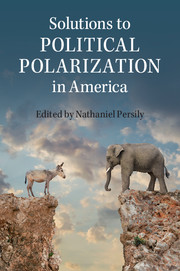Book contents
- Frontmatter
- Dedication
- Contents
- Contributors
- Introductory Chapters
- Reforming the Electoral System
- Strengthening Parties
- Empowering and Informing Moderate Voters
- Lowering Barriers to Policy Making
- 14 Beyond Confrontation and Gridlock: Making Democracy Work for the American People
- 15 American Political Parties: Exceptional No More
- 16 Partisan Polarization and the Senate Syndrome
- 17 Finding the Center: Empowering the Latent Majority
- 18 Making Deals in Congress
- 19 Helping Congress Negotiate
- 20 Staying Private
- Index
- References
17 - Finding the Center: Empowering the Latent Majority
from Lowering Barriers to Policy Making
Published online by Cambridge University Press: 05 May 2015
- Frontmatter
- Dedication
- Contents
- Contributors
- Introductory Chapters
- Reforming the Electoral System
- Strengthening Parties
- Empowering and Informing Moderate Voters
- Lowering Barriers to Policy Making
- 14 Beyond Confrontation and Gridlock: Making Democracy Work for the American People
- 15 American Political Parties: Exceptional No More
- 16 Partisan Polarization and the Senate Syndrome
- 17 Finding the Center: Empowering the Latent Majority
- 18 Making Deals in Congress
- 19 Helping Congress Negotiate
- 20 Staying Private
- Index
- References
Summary
Although many today long for the ideologically amorphous parties of the mid-twentieth century, those parties gave no opportunity to citizens who wanted a change – not simply a change of elites but also a change in policy, program, and the general orientation of government. As Woodrow Wilson said in his first Inaugural Address given on March 4, 1913, “The success of a party means little except when the nation is using that party for a large and definite purpose.” Mid-century bipartisanship, predicated as it was on the erasure of ideology, brought real benefits, especially in equipping the United States to pursue a coherent foreign policy across four decades. But it also came at a price, most notably in the bipartisan consensus to keep racial equality off the national agenda.
Yet today's parties, which offer voters a real choice, also exact a cost, one that hardly needs to be detailed amid repeated threats of national default and government shutdowns. As Mann and Ornstein argue, parliamentary parties – disciplined and devoted to convictions about public policy – can bring a separation-of-powers system to its knees (Mann and Ornstein 2012). But the intensified partisanship of the moment also has its benefits, which have been too little noted. Parties can clarify important public choices that cannot easily be avoided. Expanding entitlements, maintaining the Defense Department at present levels, cutting taxes, and balancing the budget do not form a coherent package. Today's parties are presenting the choice between additional entitlements and additional taxes (among other choices) more rigorously than they have since the resurgence of partisanship with Reagan's first election. It may be an unwelcome choice, but is a necessary one.
Partisanship itself is not the problem – not even vigorous, passionate partisanship that engages real differences. Partisanship has important purposes to serve. Yet today, the parties too often betray their great purposes.
- Type
- Chapter
- Information
- Solutions to Political Polarization in America , pp. 230 - 239Publisher: Cambridge University PressPrint publication year: 2015
References
- 1
- Cited by

